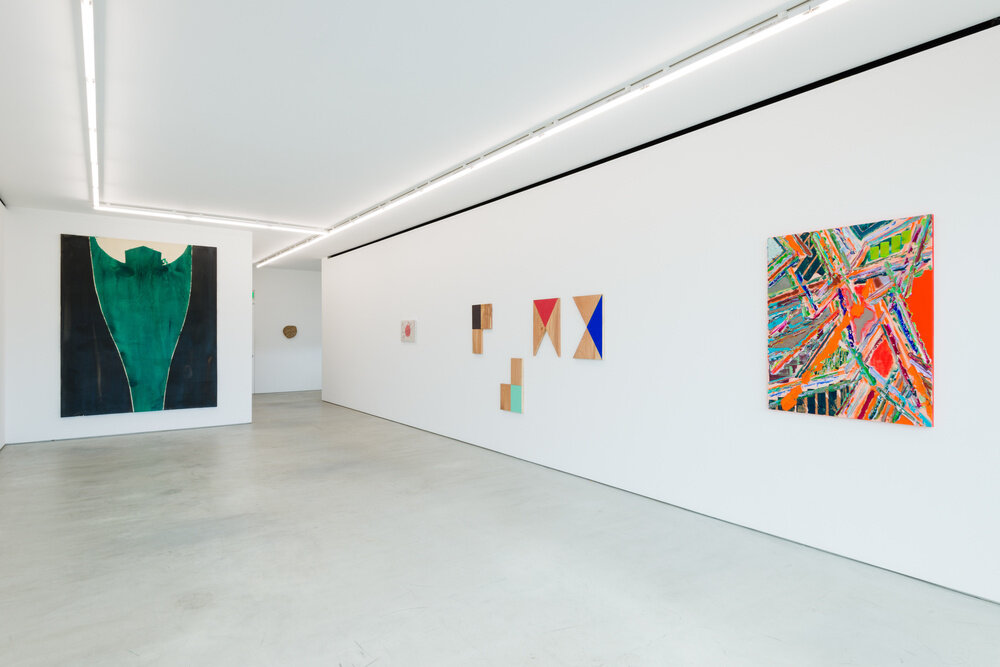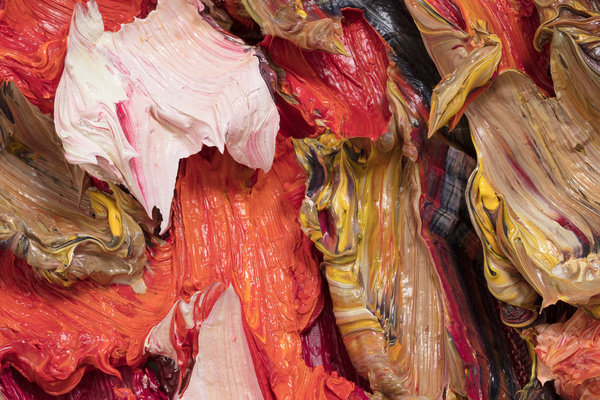Zhu Jinshi

Quentin Morris, Koji Enokura, Zhu Jinshi
May 13 – June 25, 2016Los Angeles

February 20 – March 19, 2021Tokyo

Zhu Jinshi
January 7 – February 20, 2016New York

Zhu Jinshi
June 1 – July 7, 2012Los Angeles
Broadcasts

Zhu Jinshi
July 17, 2020

Zhu Jinshi
July 2020
Biography
Zhu Jinshi (b. 1954, Beijing, China) has defined his more than four decades of artistic practice with thoughtful explorations into the meaning of painting, abstraction, and the nature of reality itself. His early exposure to the works of Wassily Kandinsky and Immanuel Kant became his gateway to modern art and theory; the latter’s argument that the world has no subject and is wholly constructed by form solidified his commitment to the materiality of painting instead of image. From this foundation, Zhu’s paintings have evolved into dense and expressive bodies of color and texture, commanding a near sculptural presence. These works can be categorized as Zhu’s All Over paintings, where his ambitious mark-making and formations extend to the ends of the canvas. Another body of work, Liubai (liúbái, meaning “to leave blank”), employs thick dabs of paint in equilibrium with the surrounding bare space of the canvas, a key element in traditional Chinese ink painting. To achieve the richness and scale of his paintings, Zhu utilizes nontraditional tools such as spatulas, brooms, and palettes to apply paint—a physically commanding task that Zhu carries out with deliberation and control.
The labor involved in Zhu’s paintings recall the era in which the artist came of age: during China’s Cultural Revolution. In Beijing, he worked in a factory rather than receiving formal artistic training. At the time, the only sanctioned style of artistic production was socialist realism in service to the state. Zhu began exploring abstract painting as early as the 1980s, when the mere deviation from the propagandist style was a gesture of defiance. He joined the Chinese avant-garde group the Stars (xīngxīng huàhuì) and participated in the seminal 1979 exhibition outside the National Art Museum, a watershed moment in the history of contemporary Chinese art. Shortly after, Zhu migrated to Germany, taking part in the diaspora of Chinese artists to western countries. There, he was immersed in the European avant-garde and began to experiment with conceptual, installation, and performance art, all the while utilizing materials rooted in Chinese tradition such as rice paper and bamboo. While Zhu eventually returned to painting, these explorations into installation and multidimensionality deeply impacted his practice. Zhu eventually returned to Beijing in 1994 and set up his studios in the outskirts of the city.
Zhu completed the Artists-in-Berlin Residency Program with the German Academic Exchange Service (DAAD); an Architecture Department lectureship at Technical University of Berlin, Berlin, Germany; and an artist residency at the Banff Center, Alberta, Canada. He has had major solo exhibitions at Tang Contemporary Art, Seoul, South Korea (2022), Hong Kong (2020), and Beijing, China (2018); Yuan Art Museum, Beijing, China (2016); Inside-Out Museum, Beijing, China (2015); Prague City Museum, Prague, Czech Republic (2002); and the Vancouver Art Gallery, Vancouver, Canada (1997). Zhu’s works has also been included in numerous milestone group exhibitions including Ways of Working: Artists' Time, Space and Body, One Art Museum, Beijing, China (2020); The Allure of Matter: Material Art from China, Los Angeles County Museum of Art, Los Angeles, CA; traveled to Smart Museum of Art, The University of Chicago, Chicago, IL (2019); Painting and Existing, Tang Contemporary Art, Hong Kong (2019); 28 Chinese, Asian Art Museum, San Francisco, CA (2015) and Rubell Family Collection, Miami, FL (2013); Alone Together, Rubell Family Collection, Miami, FL (2012); Mind Space: Minimalism in Contrasts, University of Pittsburgh, PA (2011); and the 1st Guangzhou Triennial Exhibition, Guangzhou, China (2002). His work is represented in public collections worldwide including Busan Museum of Art, Busan, South Korea; Deutsch Bank Collection, Frankfurt am Main, Frankfurt, Germany; Minsheng Art Museum, Minsheng, China; National Museum of Contemporary Art, Seoul, South Korea; Rubell Family Collection, Miami, FL; Saarbruecken City Gallery, Saarland, Germany; Today Art Museum, Beijing, China; Wall Museum, Beijing, China; White Rabbit Collection, Australia; and Vancouver Art Gallery, Vancouver, Canada, among many others. Zhu currently lives and works in Beijing, China.
Selected Works
News
Zhu Jinshi | China Pavilion, La Biennale di Venezia, Venice, Italy
04/20/2024
Zhu Jinshi: Wind in the Western Mountains | One Art Museum, Beijing, China
03/20/2024
Zhu Jinshi | Chengdu Biennale, Chengdu, China
07/16/2023
Zhu Jinshi's "Wood · Character" at Fusion Art Center
09/05/2020
Zhu Jinshi: Wood · Character | Fusion Art Center, Beijing China
06/06/2020
ArtAsiaPacific: BLACK
09/01/2016
Related Publications
Zhu Jinshi